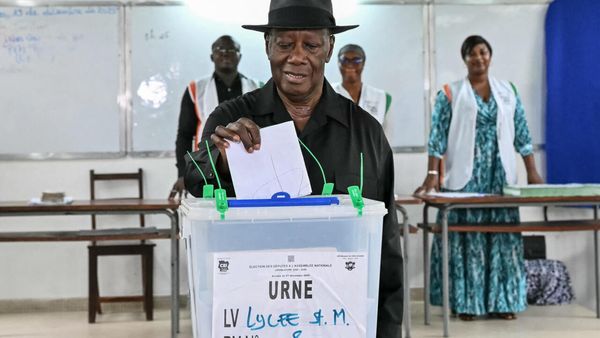
French jihadist Peter Cherif, who was close to the brothers behind the 2015 massacre at headquarters of satirical magazine Charlie Hebdo, went on trial on Monday in Paris, accused of criminal association with a terrorist enterprise.
Peter Cherif, 42, faces terrorism-related offences allegedly committed between 2011 and 2018, when he was in Yemen within the ranks of al-Qaeda in the Arabian Peninsula (AQAP) – the al-Qaeda affiliate that claimed responsibility for the Charlie Hebdo massacre.
He also faces charges relating to the 2011 kidnapping and detention in Yemen of three French aid workers, members of the humanitarian organisation Triangle génération humanitaire.
He risks life imprisonment if convicted.
Cherif, also known as Abou Hamza, was arrested in Djibouti in December 2018 after years of allegedly fighting in the ranks of AQAP.
At the time of his arrest, the then minister for the armed forces said it was “very good news because this terrorist played an important role in organising the Charlie Hebdo attack”.
The Paris court now has to establish how significant that role was.
From Paris to Iraq and back
Cherif grew up with Saïd and Cherif Kouachi – the perpetrators of the Charlie Hebdo attack – in the north-east of Paris.
All three were members of the so-called “Buttes-Chaumont” terrorist network, led by preacher Farid Benyettou.
In 2004, Cherif left to fight in Iraq within the ranks of al-Qaeda. He was captured a few months later by US forces and sentenced to 15 years in a prison in Baghdad, but escaped to Syria in 2007.
He was later extradited to France, sentenced to five years in prison in 2011, but fled to Yemen before serving his time.
In 2015 he was placed on a US "designated global terrorist" list as a member of AQAP.
He spent seven years in Yemen before moving to Djibouti in 2018 under a false identity, with his wife, who later died, and their two children.
Just three months later, he was arrested and handed over to France.
For Charlie Hebdo lawyer Richard Malka, the trial will be important in understanding Cherif's trajectory.
“He was born into a Christian family and converted to Islam. He wanted to be a paratrooper, but ended up a jihadist," Malka told RFI.
“He went from the Buttes de Chaumont to Bin Laden. His trajectory is obviously full of lessons worth meditating on. But it’s been more or less followed by tens of thousands of young people all over Europe."
Who were the Charlie Hebdo killers?
‘Facilitating’ the mission
Cherif is accused of “participating” in AQAP's military activities, and “contributing to the manufacture of improvised explosive devices and searching for targets for attacks”.
Investigating judges believe that he “facilitated the integration into AQAP of one of the Kouachi brothers, most probably Chérif”, and that he had knowledge of the plan to carry out an attack in France.
According to several witnesses, including Cherif’s late girlfriend, AQAP advised foreign fighters in Yemen to return to their countries of origin to stage attacks.
Cherif is also believed to have maintained contact with Cherif Kouachi on his return to France.
Wiretapping of Cherif's cell showed “the persistence of his radical Islamist convictions” and “his rejection of French society”, investigators said.
However, during the investigation, Cherif denied any knowledge of such a mission.
In 2020, he was a witness during the trial over the 2015 attacks and claimed to have had “nothing to do” with the operation.
Sefen Guez Guez, one of his lawyers, told French news agency AFP: "Cherif knows that the Charlie Hebdo trial weighs heavily in the balance, but he will come forward with a sincere statement."
France steps up plans to deal with Islamic radicalisation from the Caucasus
Few remaining Charlie Hebdo suspects
Seventeen people died in the Charlie Hebdo attack, including 12 killed by Saïd and Cherif Kouachi.
The brothers were shot dead by police two days after the massacre, so were never tried.
Lawyer Richard Malka hopes the trial will provide more insight into the process of radicalisation.
“What makes people abandon some of the most comfortable countries in the world, even if they're not perfect, to go and live in total barbarism and behead and slit people's throats? How is that possible? he said.
“This trial will perhaps be an opportunity to go a bit further as [Cherif] is the only individual accused of instigating the attacks to have faced trial.”
The trial runs through to 4 October.
(with newswires)







